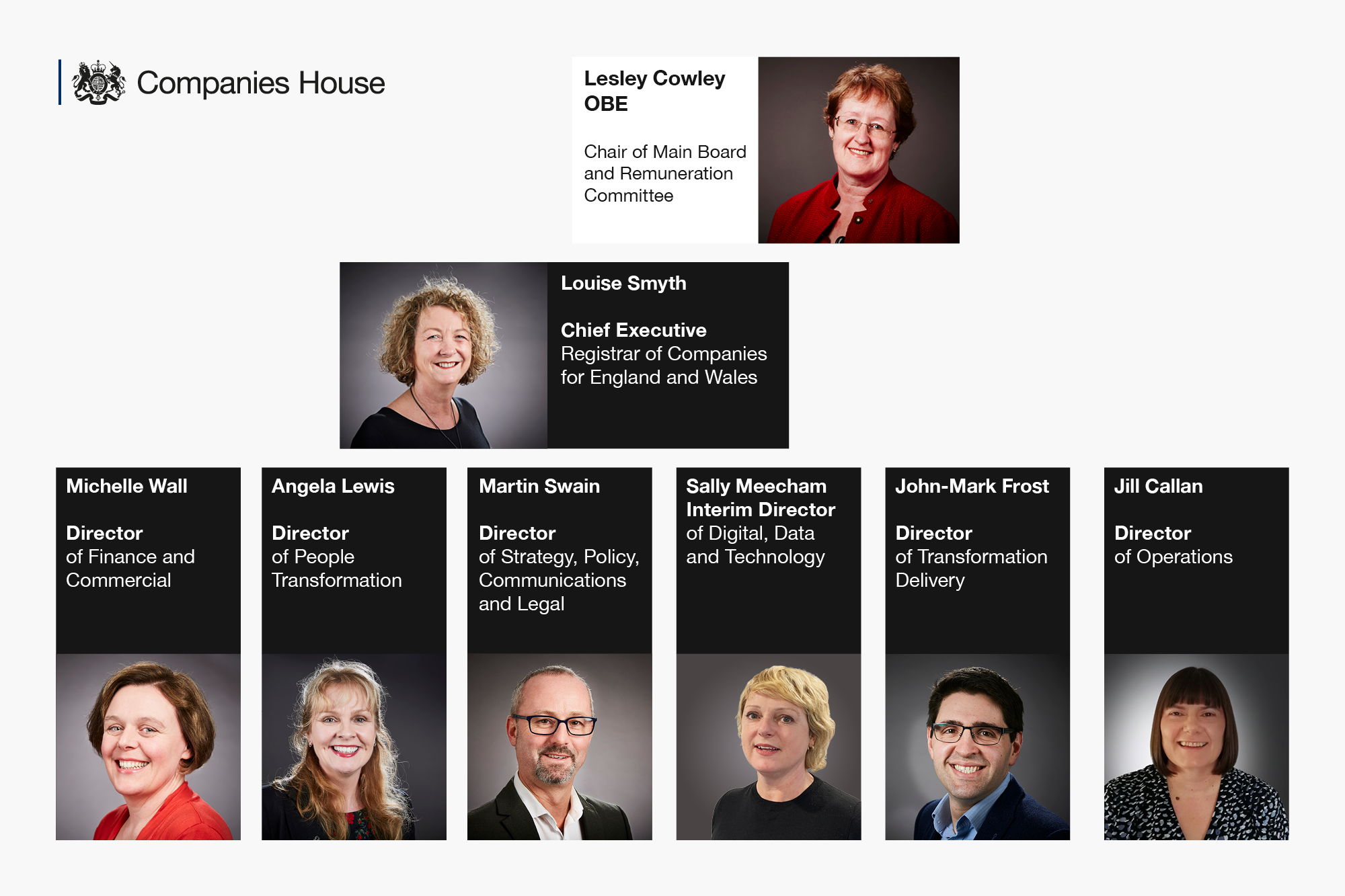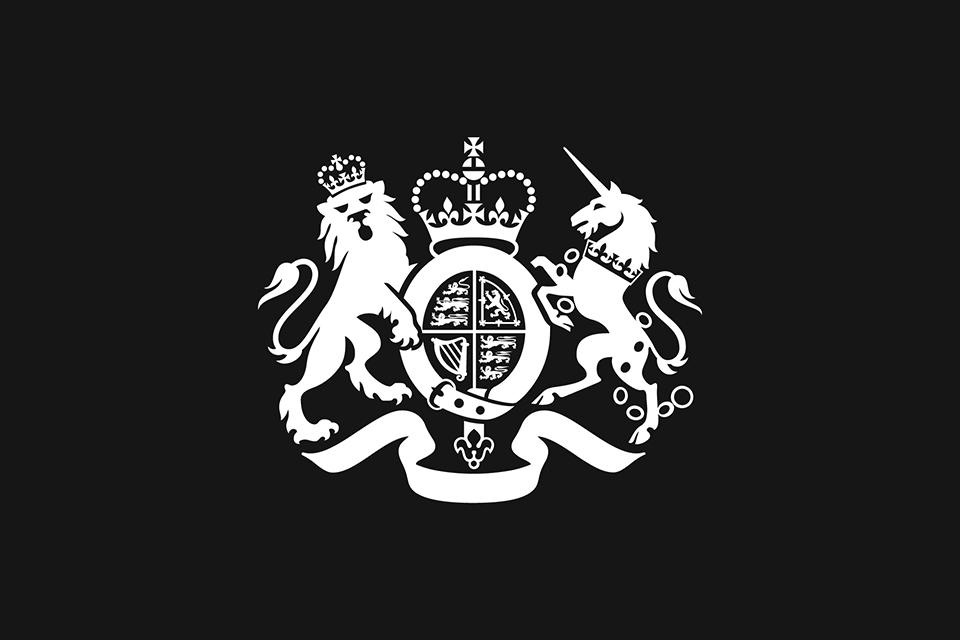Companies House corporate plan 2022 to 2023
Published 26 July 2022
Chair and Chief Executive’s foreword
We are pleased to present the Companies House Corporate Plan for the period from April 2022 to March 2023.
We welcome the measures set out in the Economic Crime (Transparency and Enforcement) Act introduced in March 2022 and we’re keen to do all we can to play our part in tackling global economic crime and improving corporate transparency to prevent a wide range of illegality, including illicit finance and money laundering.
We’ve been clear about our ambition to do more to tackle economic crime and we’ve been actively involved in shaping the government’s plans over the last few years. We published our 2020-25 strategy 2 years ago which clearly sets out our vision to be the most innovative, open and trusted registry in the world, and we’ve always known that we needed legislative reform to help us to achieve this. One of our 6 strategic goals is to ‘combat economic crime through active use of analysis and intelligence’ which demonstrates the strategic importance of this work for Companies House.
This plan marks the beginning of year 3 of our 5 year strategy and we’ve been working hard on delivering our transformation programme. This work has included quickly delivering digital solutions to support customers during the COVID-19 pandemic, transforming our systems and services to improve existing customer journeys, and scoping technological solutions for current and future challenges. Thanks to our brilliant people, we’re in a positive position as we approach the next milestone.
2022-23 is a particularly exciting year ahead as we introduce the new Register of Overseas Entities (ROE). We know that this is an immediate national priority, and we’re working at pace to make sure this is implemented as soon as possible.
We also look forward to other new legislation being brought forward during the year within a further Economic Crime Bill, which will enhance our powers to query information, increase checks to verify identities, and introduce measures to improve the exchange of intelligence between Companies House and UK Law Enforcement bodies. We look forward to working together with partners to deliver on our purpose of driving confidence in the UK economy, progressing the broad packages of reform that will make registers more effective, and the programme of activity that will enable Companies House to become a high performing digital organisation.
Lesley Cowley OBE - Chair of Companies House.
Louise Smyth - Chief Executive and Registrar of Companies for England and Wales.
Introduction
Who we are
Companies House holds the UK’s register of companies and at the end of 2021, we held information on 4.8 million companies. We are an executive agency of the UK government, sponsored by the Department for Business, Energy and Industrial Strategy (BEIS).
Through the accuracy and transparency of the information we make available on our registers, we support and promote confidence in the UK economy. We provide a multitude of information free of charge and this was accessed over 11.4 billion times last year. We also have an intelligence and enforcement arm and work closely with a range of law enforcement and other government departments to support growth in the UK economy and combat economic crime.
Over 1,000 people work for Companies House throughout the UK, with offices in Cardiff, London, Edinburgh and Belfast. The majority of staff are based in Cardiff, with submissions such as incorporation and accounts as well as other statutory filings being processed in the relevant location according to geographical area – Cardiff and London for England and Wales, Edinburgh for Scotland, and Belfast for Northern Ireland.

Our organisational chart shows how our management is structured. The main board consists of the chair, the chief executive, executive directors and non-executive board members, and:
- handles all aspects of our organisation, including performance, finances and strategic direction
- reports to BEIS on our governance, strategy, priorities and progress
What we do
Companies House incorporates and dissolves companies, registers company information and makes it available publicly. By making information on registered companies readily available, we promote transparency in the UK economy which in turn builds trust and confidence. By using our powers, we ensure compliance with legislation, and help to support the UK economy, assisting companies to thrive, as well as tackling economic crime.
At the end of 2021, we had 4.8 million companies on our register. During the year approximately 600,000 companies were incorporated. Altogether over 12.4 million transactions supplying information were received and processed.
We provide free access to information on registered companies and this was accessed over 11.4 billion times last year, including access via our application programming interface (API). Our data is used by businesses, researchers, individuals and others across government. Estimates put the value of the register to the economy at approximately £3 billion per year.
Our vision and goals
The Companies House strategy 2020 to 2025 sets out our purpose and vision:
To drive confidence in the UK economy and to be the most innovative, open and trusted registry in the world, with brilliant services delivered by brilliant people.
Tackling economic crime and driving confidence in the UK economy are our overarching objectives and fundamental principle we follow at Companies House, and this purpose presents us with both opportunities and challenges.
Our vision is to continue to be the most innovative, open and trusted registry in the world, with brilliant services delivered by brilliant people. Transparency of the information held on the register builds this trust and confidence, and in recent times, the requests for getting information that we hold are growing exponentially and we are embracing this by continuously improving our services and innovating and investing in technology.
While the demand and use of the information we hold is growing, in recent times, concern has grown that the UK’s corporate framework is open to misuse, and that this can lead to a lack of confidence in some of the data we hold. In this way, we have been looking forward to additional powers, including being able to query information and annotate or remove records, which are some of the reforms outlined in the government’s Corporate transparency consultation.
At the same time, continual advances in technology have accelerated expectations around what and how we can deliver services. We need to address these and are doing so through delivering our strategy for 2020-25 that sets out our ambitious programme of transformation. Together with the new powers being introduce this year, these, working together, will give us the means to fulfil a substantially changed role with a strengthened focus on preventing and tackling economic crime, fulfilling our purpose in new and innovative ways.

This vision is ambitious and the challenges to delivery are significant. In order for us to achieve our ambitious programme of reform, we recognise our people are our biggest asset and we’ll continue to foster our positive and respectful culture in which our people can be adaptable, bold and curious and in this way, we can achieve our best work. We’ll constantly look to attract, retain and develop the right people, with the right skills, who share our vision and will strive to promote operational excellence providing high-quality services and solutions to users that are aligned with their needs and priorities.
The highest standards of data protection and security will continue to be embedded in all our operations and we will apply principles of good governance, cost-effectiveness and responsible environmental stewardship to the conduct of our operations. In addition, Companies House will ensure full compliance with the security and data protection provisions applicable to the systems and data under our management.
Our strategy for 2020-25 sets out our 6 strategic objectives for the 5 year period. They reflect the vision of the organisation and our priorities as defined by the Chief Executive and Executive Board through dialogue with users and BEIS. These are dynamic, meaning that they will be regularly monitored and subject to regular reviews and developed over the duration of this corporate plan in order to meet the evolving needs of the organisation and all its stakeholders.
Our strategic objectives are:
- Our registers and data inspire trust and confidence.
- We maximise the value of our registers to the UK economy.
- We combat economic crime through active use of analysis and intelligence.
- Our brilliant services give a great user experience.
- Our culture enables our brilliant people to flourish and drives high performance.
- We deliver value through efficient use of resources.
We’ll continue to make progress with these strategic objectives in the reporting period and this plan sets out what we aim to deliver in 2022 to 2023 as part of our transformation journey. The main planned activities aligned to our strategy are outlined below along with our supporting structure and finances.
The external landscape
The wider economic and political environment in which Companies House operates continues to be challenging, whilst at the same the changing landscape is providing new and potentially exciting opportunities.
Right now, we’re embarking on a significant moment in time where new legislation is being introduced which will strengthen what data we hold, what powers we have to use and share this data, and in turn, this will bolster the role Companies House plays in the UK economy. In 2021, the government published its consultation on wide ranging reforms to the powers and role of Companies House, to improve business transactions and tackle economic crime.
As we launch this corporate plan, the government’s Economic Crime (Transparency and Enforcement) Act 2022 has received Royal Assent. In particular, the Register of Overseas Entities (ROE) has been accelerated and our contribution to the fight against economic crime has been strengthened and is particularly significant in the current geopolitical climate. We’ll prioritise the introduction of ROE early in 2022-23, which will ensure that property and landowners from outside the UK will be transparent on a publicly available register.
In addition, other components of the Economic Crime Bill (Part 2) are likely to be introduced during 2022-23. Once the package of legislative reforms are in place, we’ll be able to verify the identities of those registering companies and filing information. We’ll also have the powers to query the accuracy of data being held and subsequently annotate and ultimately remove it from the register if we deem it cannot be trusted.
Such reform will lead to improved checks on the information submitted to and held on our register. It will also lead to greater protection of personal information on the companies register and will improve co-operation and data sharing between Companies House and UK Law Enforcement Agencies, and other public and private sector organisations. This programme of new legislation will allow us to be even more effective in preventing the abuse of the UK’s company law framework, which is globally recognised as supporting very high standards of corporate behaviour.
As well as the legislative context, our analysis of external factors must also include the recent coronavirus (COVID-19) pandemic, which has led to increased uncertainty in the operating environment of both the private and public sectors in the UK. Companies House has adapted well to face this challenge and is applying, and will continue to apply, the lessons learned over the last 12 months of operation to continue to provide an excellent service to our users and to accelerate toward a fully digital organisation that will take advantage of this shift in user behaviour to promote further digitisation where appropriate.
In terms of economic factors, the current high demand against a low supply of available workers within the labour market continues to impact us, as it does all UK employers. Our strategic workforce planning approach will help us to mitigate this and plan for the workforce we need for this reporting period, for the delivery of our strategy to 2025 and beyond. This planning will by necessity be dynamic and will evolve within the operating environment. We will draw on a range of data and regularly review across the business to ensure that we have the right people, in the right place, at the right time - and with the right skills to fulfil our strategic ambitions and changing role in government.
What we plan to deliver
During 2022 to 2023, the pace and scale of change will be stepped up significantly as we move to year 3 of delivering our transformation strategy, as well as delivering legislative reform.
This year is pivotal on our transformation journey as all of our people work towards the shared goal of realising our ambition to be the most innovative, open and trusted register in the world. We’ll be introducing new registers and implementing new powers brought about by the introduction of new legislation, as well as delivering year 3 of our 5 year strategy. This includes developing our organisational capability to further improve the quality of the register, further enhancing our digital capabilities and systems (internal and external) and to have a workforce that has the right skills to be able to continue to deliver our 5 year strategy.
During 2022 to 2023 we’ll significantly increase the energy, pace and scale of change within our organisation, upping the tempo of both transformation and improvements to existing ‘business as usual’ processes and systems aimed at improving user journeys and enhancing the efficiency of our systems.
We’ll continuously improve our services to customers and this year we’ll embed our service-led operating model, enabling us to deliver brilliant services to our customers while also ensuring we develop a solid foundation of performance and compliance through the rollout of the professions’ framework and the functional standards. Our new operating model is rooted in driving our ambitious, bold and curious (ABC) behaviours and our collaboration throughout Companies House.
This ambitious transformation programme also allows us to realise benefits through, for example, increased automation and further modernising delivery of digital services. This will in turn make our services more intelligent and intuitive and will enable customers to get it right first time when engaging with our services, helping to improve the compliance rates and quality of data we hold.
Planned investment in advanced analysis and new data sharing gateways will enable us and our partners to derive even greater value from our data, and will underpin our participation as a key enabler in implementing the new legislation that underpins the government’s Economic Crime Plan.
We’ll be introducing a new register for overseas entities (ROE). It will require overseas persons who own land or property in the UK to reveal the identities of their beneficial owner (or owners) and register them with us, at Companies House. This will provide more information for law enforcement to help them track down those using UK property as a money laundering vehicle, and sanctions will be introduced for non-compliance. We’ll be working closely with the 3 UK land registries to achieve this, as there are separate land registries for England and Wales, Scotland, and Northern Ireland.
In addition to bringing forward ROE, the government has also prioritised the wider legislative reform package and published a Corporate transparency and register reform white paper in March 2022 on the pace of their ambition. This means it will now move forward through the parliamentary process and Part 2 of the Economic Crime Bill could be introduced early in 2022 to 2023.
When the powers of the registrar are expanded through the introduction of new legislation throughout 2022 to 2023 and beyond, then it will make it possible for us to verify the identities of those registering companies on our registers. By verifying and validating more data on the register, in turn we’ll enhance the accuracy of the data we hold for consumers to use. It will also enable us to undertake more analysis as well as share information with others, in order to contribute even more with the fight against economic crime.
Companies House will continue to work closely with BEIS in delivering this legislative reform and our wider transformation. To deliver the legislative changes, we’ll continue to focus on improving our 3 pivotal services:
- company filing
- get company information
- intelligence and enforcement
As this plan takes us into the third year of our transformation programme, we’ll continue to address organisational and performance challenges and refine the organisation for the benefit of our customers and stakeholders.
We’ll continue to move away from legacy systems and improve existing customer journeys, as well as develop new services. For example, we want to introduce a new service for the appointment of directors and make further enhancements to the confirmation statement and insolvency services, which we hope to achieve, depending on the scale of change and prioritisation required for legislative reforms.
At the same time, we’ll continue to collaborate to develop the capabilities, skills and structures to meet the proposed legislation and deliver the necessary changes to our services and operations. Some of the proposed targets and plans may need to adapt and flex depending on the scale and timings of the delivery of legislative reform, which must take priority, as we together fight against economic crime and support growth in the UK economy.
Corporate targets
In order to provide a structured approach to achieving our strategic goals outlined above, a number of targets have been identified and aligned to these goals, in order to encourage their implementation and subsequent monitoring.
Companies House will track the progress and assess delivery of these targets throughout the reporting period, providing regular information about development, progress and performance to all stakeholders. The targets will support the journey toward successful delivery of our strategic goals during 2022 to 2023.
1. Register of overseas entities (ROE)
Introduce a register of overseas entities: contributing towards the fight against economic crime.
2. Complete and up to date data
97% of companies on the register have filed a confirmation statement.
High levels of compliance are essential to ensure the register holds timely and accurate data.
3. Digital service availability
Digital services are available for a minimum of 99.9% of the time.
Very high service availability enables our customers to use our services when they need to, inspiring customer confidence and supporting high satisfaction levels.
4. Customer satisfaction
We will be in the top 20% of public sector organisations for customer satisfaction.
High levels of customer satisfaction will demonstrate we are meeting customer expectations, and will further build reputation as a centre of excellence.
5. Diversity
We will increase the number of staff recruited to Companies House from under-represented groups by 10%.
Increased diversity will help Companies House be more representative of its customer base and help it to be a more interesting and desirable employer, thus increasing the talent pools to which we have access.
6. Delivering value
We will manage expenditure set out within budgetary limits.
Delivering the priorities defined in corporate targets whlie keeping expenditure within delegated limits, ensures public value is maintained.
Environmental targets
In addition to these corporate targets, we’re committed to reducing our impact on the environment which include the government’s target to reach net zero carbon emissions by 2050 and the Greening Government Commitments 2021 to 2025.
See Companies House and the environment.
Meeting our strategic goals
This section describes our planned activity for 2022 to 2023 that will allow us to progress towards fully meeting the strategic objectives outlined within our strategy for 2020 to 2025.
Strategic goal 1: Our registers and data inspire trust and confidence
During the reporting period Companies House will continue to help its users to deliver exceptional levels of compliance for submission of accounts and confirmation statements. We’ll help users to remain compliant so that we can meet an integral element of our mission, which is to ensure the integrity of the data held on the register, which in turn therefore ensures the information is trusted and drives confidence in the economy.
We must continue the team effort across the organisation to deliver these changes and embrace the pace of change as an opportunity to transform, making further enhancements to services to improve our already world-beating service offering to users. For example, by late 2021 we had already introduced the first iteration of our new confirmation statement service on our new platform, and we’re already seeing signs of increased compliance.

We’ll progress towards this strategic goal during the reporting period by:
- aiming to further improve confirmation statement compliance (and other forms of compliance) through targeted external communications measures and business improvement initiatives
- cementing our position and reputation as the best register in the world by continuing our commitment to improve data quality in addition to demonstrating reliably high rates of confirmation statement filing
- identifying data matching opportunities, increasing the role of data analytics in enforcement and data sharing where possible
- paving the way for when further new legislation is introduced so that we’ll be ready to verify identities of those registering and entering data, and to query the accuracy of the data, and when appropriate, take action to improve its accuracy through annotation or deletion
- developing baseline measures to track progress toward delivery of corporate goals, including use of customer satisfaction surveys and other feedback from users
Supporting public target for 2022 to 2023
97% of companies on the register have filed a confirmation statement during the reporting period.
Strategic goal 2: We maximise the value of our registers to the UK economy
We’ll continue to strive to provide increased and improved access to the data we hold and will explore ways to augment user interfaces over a variety of domains. We’ll build on our legacy systems to allow users to access and analyse data on demand where possible. We’ll also continue to work on digitising existing physical certificates and copies and to make these available.
Additionally, we’ll continue to work with colleagues across government to define how data from the register can be better integrated into and support decision making processes.

We’ll progress towards this strategic goal during the reporting period by:
- continuing to improve search and reporting interfaces for users, building on and further enhancing the ground-breaking work done on ‘advanced search’ as part of our transformation journey
- continuing on our digital journey to continuously improve our efficiency, reduce cost to business and reduce our impact on the environment
- making registry data available to be better used to inform decisions in other areas of government, and proactively sharing the information we hold across relevant government departments and law enforcement agencies in an efficient and joined up manner
Strategic goal 3: We combat economic crime through active use of analysis and intelligence
On 15 March 2022, the Economic Crime (Transparency and Enforcement) Bill received Royal Assent. This means that persons outside the UK that own land or property in the UK must register their identities. Entities who refuse to reveal their ‘beneficial owner’ will face restrictions on selling the property or land, and those who break the rules could face a fine of up to £2,500 per day or up to 5 years in prison.
This will be a valuable tool for law enforcement agencies in investigating suspicious wealth. Companies House is setting up the Register of Overseas Entities (ROE) as quickly as possible, and we’ll be prioritising this work for early 2022-23. We’ll work closely with the 3 land registries across the UK throughout.
We’ll be stepping up our intelligence and enforcement activities in 2022-23, both in terms of maximising the powers we currently have and in anticipation of new powers that will be introduced in legislation throughout 2022-23 and beyond. Therefore, we’ll increase our use of data science and digital research to develop data-driven insights on patterns of activity and behaviour from information held on the register, and will make this available to law enforcement partners through our intelligence hub.
We’ll continue to play our part through collaboration and co-operation with partners across government and law enforcement in sharing information that we hold. In terms of the arrival of further new legislation anticipated during 2022-3, this will introduce a substantial increase in powers that will strengthen how we can contribute in fighting economic crime. It will further enhance our already significant role in detecting and preventing criminal activity, by providing law enforcement partners at both strategic and tactical levels with information and intelligence that supports their investigation and enforcement activities.

We’ll progress towards this strategic goal during the reporting period by:
- introducing a Register of Overseas Entities and other components of new legislation when they come on stream, strengthening our role and contribution in the fight against economic crime and supporting growth in the UK economy
- better leveraging existing methodologies and legislative frameworks to fight economic crime and increase collaboration with other government partners in order to do so
- delivering ongoing transformation to enable Companies House to play an enhanced role in fighting economic crime through active use of analysis and intelligence
- developing the intelligence hub within Companies House to identify strategic and tactical threats of economic crime on the register and to provide fast and comprehensive support to law enforcement investigations throughout the UK
Supporting public target for 2022 to 2023
Introduce a Register of Overseas Entities: contributing towards the fight against economic crime.
Strategic goal 4: Our brilliant services give a great user experience
Companies House takes pride in maintaining a high standard of customer service and receives good levels of positive feedback from users.
Our online services have been vital during the pandemic and providing and accessing information remotely has helped our users and our staff to stay safe. This means that we must continue to ensure services are available to our customers whenever and wherever they need them. We have a record of high availability, and we’ll continue to deliver to that standard: maintaining and developing the infrastructure that supports it through a transformation programme that develops and invests in these capabilities to consistently improve our service offering to users.
As part of this comprehensive transformation programme, we’ll continue to move our existing services to new technology platforms. We’ll replace legacy customer service and internal systems in order to deliver new user journeys required to implement future legislation and improve our overall service offering.

We’ll progress towards this strategic goal during the reporting period by:
- maintaining existing customer service levels and continuing to measure, benchmark and monitor our overall customer satisfaction
- maintaining high availability levels of all digital services to users
- continuing to upgrade and replace first generation systems and move existing services to new technology platforms to improve user journeys
- further developing the online journey for submission of confirmation statements
- continuing to develop a fully digital service for insolvency transactions
- developing a new online journey for company directors to be appointed, terminated and changed
- improving payment systems
Supporting public targets for 2022 to 2023
We will be in the top 20% of public sector organisations for customer satisfaction.
Digital services will be available for a minimum of 99.9% of the time.
Strategic goal 5: Our culture enables our brilliant people to flourish and drives high performance
We’ll implement an ambitious programme of work which will enable staff to deliver and continue to develop during this period of transformation, and to collectively build on the strong culture that already exists in our organisation. To do this, we’ll undertake the following during the reporting period:
We’ll fully embed the operating model around our 3 key service areas: company filing, get company information, and intelligence and enforcement. This will enable us to scale and flex our operations and support functions much faster, giving us increased agility and empowering service owners with more autonomy of their areas, while continuing to work collaboratively to ensure co-ordination across the services and understand organisational level impacts.
We’ll further develop and implement our workforce strategy and further implement our hybrid working approach to support the high performance of staff, with a focus on skills and future skills development and an emphasis on professions and functional standards. We’ll engage with all colleagues throughout the transition to hybrid working, supporting leaders to manage the change in how and where we do our work.
We’ll continue to engage and foster our culture change community, our networks and directorate engagement groups, providing this colleague-led change movement with effective internal communication and providing opportunities to get involved in decision making.
We’ll prioritise recruitment and retention. We’ll increase engagement, connection and voice for all existing staff and facilitate an increase in applications and appointments from underrepresented groups. We’ll use creative advertising techniques to reach wider audiences and ensure onboarding of new recruits is seamless and a positive employee experience.
We’ll adapt and implement a refreshed reward and benefits package to reflect our new ways of working and labour market challenges. This will ensure our employee value proposition is competitive and help us to attract and retain the best talent.
We’ll implement a leadership and management development programme and introduce ‘profession’ specific development interventions and a longer-term talent management approach, aligned to strategic workforce planning.

These transformative actions are not insignificant and will require collaborative, cross-organisational effort to implement. It goes without saying that these initiatives will not be successful without the full support and engagement of Companies House employees, with some requiring additional resources and time to achieve. The tracking and measurement of these goals and actions will continue throughout the reporting period, ensuring they are kept at the forefront of business decisions throughout 2022 to 2023.
Supporting public target for 2022 to 2023
We will increase the number of staff recruited from underrepresented groups in Companies House by 10%.
Strategic goal 6: We deliver value through efficient use of resources
During 2022 to 23, we’ll continue to deliver defined corporate targets while keeping expenditure within delegated limits. We’ll improve our efficiency measurements and reporting and work towards integrating efficiency metrics into our public targets for resourcing, using the framework for efficiency and effectiveness measures in the public sector as outlined in Managing public money.
Our people remain our most important resource. Our workforce strategy therefore will continue to play a major role in ensuring future efficient and effective use of our people resources.
We’ll also continue the essential but less visible work needed to improve and automate our internal systems and processes.
During this year, we’ll continue our work in embedding the Public Value Framework into our planning and decision-making processes.

We’ll progress towards this strategic goal during the reporting period by:
- keeping expenditure within delegated limits
- improving the efficiency of our internal systems and processes
- reducing the physical estates footprint and further encouraging and supporting flexible ways of working
- developing working relationships and work more effectively across government and with other stakeholders
Supporting public target for 2022 to 2023
We will manage expenditure set out within budgetary limits.
Companies House and the environment
The environment is a key focus for our organisation and one that we consider in all aspects of our business, including our internal operations, all our supply chains and how we and our customers interact both on and offline.
Companies House will play its full part in the public estate’s effort as it continues to reduce its environmental footprint, align with commitments in its 25 year environment plan and remain consistent with a trajectory to achieving net zero greenhouse gas emissions by 2050.

During the reporting period, we’ll:
- continue to integrate positive environmental outcomes into all elements of the corporate plan
- continue to develop government commitments on tackling climate change
- implement the Greening Government Commitments (GGCs)
- monitor and subsequently reduce our environmental impact in line with our strategy
- continue to identify and introduce processes that will significantly improve our own environmental performance, and services that will help customers to reduce the environmental impact of transacting with us
In addition to minimising waste and improving resource efficiency, the GGCs also set out targets for UK government departments and their agencies to reduce water consumption and reduce their greenhouse gas emissions. They also outline commitments to improve sustainable procurement, develop and deliver nature recovery plans, develop and deliver climate change adaptation strategies and reduce environmental impacts from ICT and digital services.
In addition to the public target, Companies House will also continue to report our progress on the full spectrum of these GGCs.
Transformation
Transformation is a theme which is woven through all Companies House priorities and planned work for the coming year. This programme is key in enabling us to deliver on our strategic goals over the life of the strategy and beyond. During the reporting period 2022 to 2023, we’ll continue to transform across the full spectrum of our activities to address identified organisational and performance challenges and to reform the organisation further for the benefit of our users and other stakeholders.
The transformation programme and the hard work of our staff is improving an already high performing organisation, helping us to significantly augment our existing services and preparing us for the fundamental changes to our ways of working as a result of impending legislative reform. This is a really exciting time for Companies House and the transformation of internal and external systems. Changes for our people (capability, skills and culture) are culminating in successful delivery and improved services for users now, and in terms of the strategic intent of the legislation coming forward in the months ahead.

While our first phases of transformation have been successful, there is still much more to do and further significant improvements to be made. With this in mind, our transformation during the reporting period will continue to be centred on the ambitions, priorities and goals outlined in our 5 year strategic plan.
As we progress this ambitious and wide-ranging programme, we’ll remain focused on our ultimate purpose: to use transformation to provide enhancements and improvements to our services in order to continue to provide a world-beating service to our users.
Financial resources
These tables set out the financial allocation for 2022 to 2023 and indicative future 2 years fees.
| Budget (£m) | |||
|---|---|---|---|
| Delegation | 2022/23 (final) | 2023/24 (indicative) | 2024/25 (indicative) |
| Resource | |||
| Late filing penalties | 9.0 | 9.0 | 13.0 |
| Transformation and service delivery | 10.0 | -23.0 | -13.8 |
| Capital | |||
| Transformation and service delivery | 14.7 | 17.4 | 15.5 |
| Estates maintenance | 0.7 | 0.7 | 0.7 |
For 2022 to 2023 only
| Budgets | Resource (£m) | Capital (£m) |
|---|---|---|
| Service delivery - income | (73.9) | |
| Service delivery - expenditure | 77.2 | 4.5 |
| Transformation | 6.7 | 10.3 |
| Late filing penalties | 9.0 | |
| Depreciation | 9.1 | |
| Estates maintenance | 0.7 |
Fees
Fee income is set on a cost recovery basis and is reinvested into the organisation to deliver our services.
During the reporting period, we will:
- in line with Managing public money principles and wider precedents, review and where necessary adjust Companies House fees to ensure that levels remain appropriate
- continuously review our funding model to reflect changes to mandate, legislation and services
